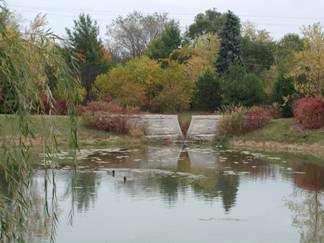Municipal storm water permit overview
DNR Photo - Pete Wood
About 245 municipalities in Wisconsin are currently required to have a Municipal Separate Storm Sewer System (MS4) permit under NR 216, Wis. Adm. Code [exit DNR]. An MS4 permit is required for a municipality that meets one of the following criteria:
- It is located within a federally-designated Urbanized Area [exit DNR]
- Its population equals 10,000 or more based on the latest decennial census; or
- When the Department of Natural Resources designates the municipality for permit coverage in accordance with s. NR 216.025. The MS4 permits are effective for a period of up to five years, at which point the permits are updated and re-issued.
- WPDES MS4 General Permit WI–S050075–3 [PDF]
- WPDES WisDOT TS4 General Permit WI-S066800-2
- Search municipalities covered under a WPDES MS4 Permit
Municipal permits require storm water management programs
The MS4 permits require municipalities to reduce polluted storm water runoff by implementing storm water management programs with best management practices. The MS4 permits usually do not contain numerical effluent limits like other WPDES permits.
Municipal storm water management programs cover a wide array of activities that occur within a municipality. The permits usually contain requirements for the following.
- Public Education and Outreach [exit DNR] - The MS4 permit specifies that public education and outreach programs be developed to encourage the public and businesses to modify their behaviors and procedures to reduce storm water pollution.
- Public Involvement and Participation [exit DNR] - In addition to public education and outreach, the MS4 permit requires municipalities to encourage participation from individuals to prevent storm water pollution. Some examples of public involvement are volunteer stream monitoring, storm drain stenciling, presenting information to established community groups, or planting a community rain garden.
- Illicit Discharge Detection and Elimination [exit DNR] - Storm sewers that carry rain water runoff are not intended for other fluids and waste material. These pollutants are illicit discharges and may have the potential to harm people, animals and aquatic life in the downstream rivers, lakes and wetlands. Municipalities are required to develop programs to identify, prevent, and eliminate illicit discharges to their storm sewer systems. The DNR has developed additional illicit discharge detection and elimination guidance to assist municipalities with this requirement.
- Construction Site Pollutant Control - Municipalities are required to develop a soil erosion control ordinance and enforce it on construction sites. Municipalities may use state-recommended technical standards for methods and products used to control erosion and prevent sediment-laden water from discharging into a lake, stream or wetland.
- Post-Construction Storm Water Management - Municipalities are required to develop a post-construction ordinance and enforce it to ensure that areas of new and redevelopment will include structural measures to control pollutants, control peak flow, maintain infiltration, and establish vegetated protective areas adjacent to waterways and wetlands. Municipalities may use state-recommended technical standards for post-construction storm water management practices.
- Pollution Prevention Practices for the Municipality [exit DNR] - MS4 storm water programs are to include practices to prevent pollutants from municipally-owned transportation infrastructure, maintenance areas, storage yards, sand and salt storage areas, and waste transfer stations entering the storm sewer system.
- Developed Urbanized Area Standard - Municipalities are required to control the Total Suspended Solids (TSS) carried in storm water from existing urban areas as compared to no controls. Many municipalities have already achieved the state standard of 20 percent TSS. Compliance with the standard is achieved by implementing a system of practices and activities, which has been verified by a storm water computer model.
- Storm Sewer System Maps - Municipalities covered by an MS4 permit area are required to maintain a map of the storm sewer system. These maps identify storm sewer conveyances such as pipes and ditches, and also identify roads, streams and lakes.
Review of municipal programs and reports
DNR may review the programs and activities that municipalities will use to comply with the MS4 permit. Municipalities are also required to submit an annual/biennial report to the DNR to document progress and compliance with the permit requirements.
» MS4 eReporting - Access online water permit system
Frequently Asked Questions (FAQs) from Citizens
Find answers to Frequently Asked Questions
Other information
- Whose Pond is it Anyway?
- Model Ordinances for Construction Site Storm Water Management [PDF]
- Learn More about Storm Water Runoff
- Wisconsin Pollutant Discharge Elimination System Permits
- Water-related Permits
- Fecal Bacteria Webinar by Dr. Sandra McLellan - A webinar discussing how to identify sources of fecal bacteria in the urban environment, why it is important to reduce fecal bacteria in urban runoff and the different tool available to complete fecal bacteria testing.

